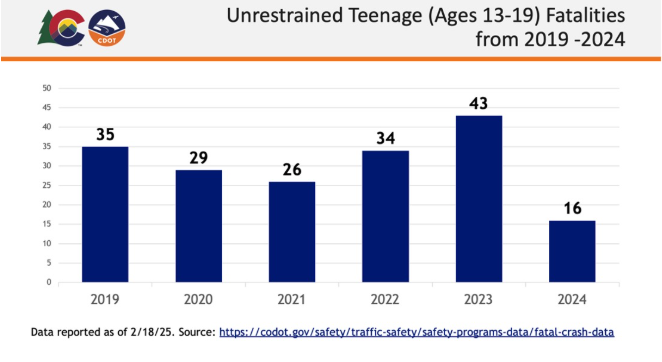First Click It or Ticket enforcement period of the year begins today
News Release
La primera campaña de Abrochado o Multado del año empieza hoy en español
Statewide — From April 7 to 13, the Colorado Department of Transportation will support Colorado State Patrol and 38 local law enforcement agencies throughout Colorado for the first seat belt enforcement period of 2025. During the one-week period, law enforcement will increase patrols and focus on issuing citations to unbuckled drivers as part of the national Click It Or Ticket effort. Drivers with unbuckled passengers can also be ticketed.
This will be the first enforcement effort since Colorado’s seat belt law was expanded to include teens up to 18 years old. The new law took effect Jan. 1, 2025, raising the age requirement for seat belt use from 16 to 18. Anyone under the age of 18 must be properly restrained in a seat belt or child restraint system. Violating this law is a primary offense, meaning enforcement officers can pull over drivers if they observe an unrestrained child in the vehicle. More information about the law updates can be found on the Colorado Child Passenger Safety Law webpage.
“The updates to the law help protect teenagers in cars, whether they’re driving or riding as passengers. While teenager fatalities without seat belts are falling, this age group still has the lowest use rate,” said Col. Matthew C. Packard, chief of the Colorado State Patrol. "Parents and caregivers should talk to your kids about their ongoing driving behavior and model wearing your seat belt."

During last year’s CIOT enforcement periods, law enforcement agencies recorded 159 violations for teenagers who failed to buckle up. Additionally, 96 adults received violations for failing to secure children with a restraint system, such as a car seat.
“Seat belts are essential for protecting everyone on the road,” said CDOT’s Office of Transportation Safety Director Darrell Lingk. “Whether you’re in the driver’s seat, a passenger seat or in the back, buckling up is non-negotiable. And remember when you are unbuckled you also pose a risk to others since you can become a human projectile in a crash. The odds of a belt-restrained driver sustaining a fatal injury is 137% higher when the passenger behind them is unbelted.”
Colorado’s child restraint system law also received an update this year. Now, children under the age of nine are required to sit in a car seat or booster seat while riding in a passenger vehicle. Children under the age of two and below 40 pounds are also required to sit in a rear-facing car seat, a change from under the age of one and below 20 pounds. For other law changes and more information visit CarSeatsColorado.com.
According to CDOT’s 2024 Seat Belt Survey, the seat belt usage of Coloradans in 2024 was 88.19%, the third-highest usage percentage ever recorded in the state. However, it is still below the national average of 91.9% as reported by the National Highway Traffic Safety Association (NHTSA) in 2023.
Following the April Wave, the next seat belt enforcement period will occur from May 12 to June 1. Learn more about CDOT’s latest seat belt PSAs, highlighting the most unforgiving laws of all — physics.
This enforcement period coincides with Distracted Driving Awareness Month, a reminder that buckling up and staying focused behind the wheel go hand in hand in preventing traffic fatalities. With Colorado’s new hands-free law now in effect, drivers are urged to put their phones down and pay attention to the road. Learn more about how Colorado’s Hands-Free law drove a 135% increase in distracted driving citations here.
Vehicle collisions are a leading cause of death for children ages 1 to 13. Last year, out of more than 5,000 car seat checks performed in Colorado, there was a 66% misuse rate. Parents and caregivers can learn more about Colorado child passenger safety laws, recommendations and recalls at CarSeatsColorado.com.
About Click It or Ticket
Click It or Ticket is a nationwide campaign from NHTSA. Since Click It or Ticket was introduced in Colorado in 2002, statewide seat belt use has increased from 72% to 88%. For more information about seat belt safety and enforcement citation numbers, visit SeatBeltsColorado.com.
Colorado’s seat belt laws
Colorado law requires the driver and every front seat passenger of a motor vehicle and the driver and every passenger in an autocycle equipped with a safety belt system to wear a seat belt whenever the vehicle is in operation on a street or highway.
- Adults — Colorado has a secondary enforcement law for adult drivers and front-seat passengers. Drivers can be ticketed for violating the seat belt law if they are stopped for another traffic violation.
- Teens — Colorado’s Graduated Drivers Licensing (GDL) law requires all drivers under 18 and their passengers, regardless of their ages, to wear seat belts. This is a primary enforcement, meaning teens can be pulled over simply for not wearing a seat belt or having passengers without seat belts.
- Children — Colorado's Child Passenger Safety law is a primary enforcement, meaning the driver can be stopped and ticketed if an officer sees an unrestrained or improperly restrained child under the age of 18 in the vehicle.
Fines for not buckling up in Colorado start at $65, and parents or caregivers caught with an improperly restrained child can receive a minimum fine of $82. Caregivers can face additional charges if the law is not followed and the child is injured.
Crash Not Accident
Note to reporters: Crashes are no accident — they are preventable. We would appreciate you saying 'crash' instead of 'accident' when reporting.
